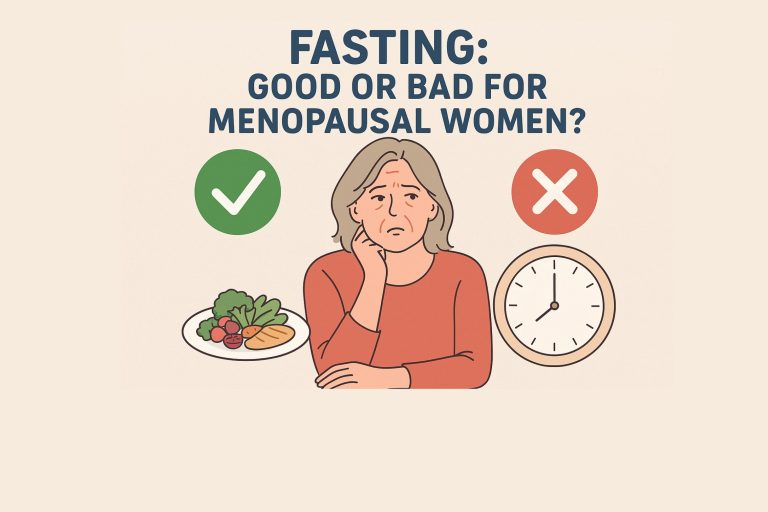
A balanced look at the benefits and myths
By Alex Flint
Intermittent fasting for menopausal women has become a widely discussed tool for health and weight management, but is it truly beneficial? I believe the answer, as with most things in nutrition, is nuanced. While fasting can be an effective strategy for some, it doesn’t suit everybody. There is also a lot of misinformation out there, particularly with regards to the effects of fasting on menopausal women.
Let’s use science to debunk some of the common myths around fasting and it might help you determine whether it’s right for you.
The science behind fasting
Simply put, fasting works primarily through calorie restriction, not because it possesses any magical properties. When you consume fewer calories than you expend, your body taps into stored energy, leading to weight loss and metabolic benefits. Research has also shown that intermittent fasting can improve metabolic health, reduce inflammation, and support cognitive function. https://www.nia.nih.gov/news/research-intermittent-fasting-shows-health-benefits https://bmcmedicine.biomedcentral.com/articles/10.1186/s12916-024-03716-1
Debunking myths about fasting and menopausal women
One of the most persistent claims is that fasting is harmful to menopausal women due to cortisol spikes and muscle loss. However, to the best of my knowledge, there is no peer reviewed research that definitively supports this claim. A study published in Nutrients examined the effects of intermittent fasting combined with high-intensity interval training (HIIT) in postmenopausal women and found significant improvements in body composition and endurance. https://www.mdpi.com/2072-6643/17/7/1121. While hormonal fluctuations can impact metabolism, fasting itself does not inherently cause muscle loss when paired with adequate protein intake and resistance training. https://bmcwomenshealth.biomedcentral.com/articles/10.1186/s12905-023-02671-y
Fasting vs. continuous calorie restriction
Some argue that fasting is superior to continuous calorie restriction, but research suggests that both approaches can be effective. A review in BMC Medicine compared different types of intermittent fasting with continuous energy restriction and found that alternate day fasting ranked highest for metabolic health improvements. https://bmcmedicine.biomedcentral.com/articles/10.1186/s12916-024-03716-1 . However, all things considered, the effects of continuous calorie restriction (i.e lowering your overall daily calorie intake) also yields very similar results to fasting.
Is fasting right for you?
Fasting can be a useful tool, but it’s not a one-size-fits-all solution. If you’re considering fasting, keep these points in mind:
Ultimately, fasting is not magic, but it can be an effective strategy when done correctly. For many it creates a solid daily structure with clear guidelines around when, and when not to eat, making sensible eating easier. For others, it’s a highway to starvation and then overeating later in the day. The key is to listen to your body and see what works for you and your lifestyle. If you are struggling to lose weight and/or need more advice about fasting, get in touch to discuss what’s best for you and your goals.
Call/text Alex Flint 021 808 210 or email info@bodytorque.co.nz